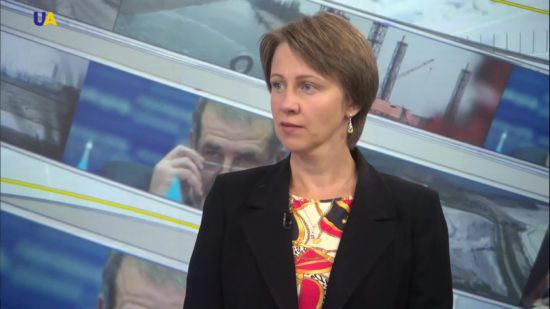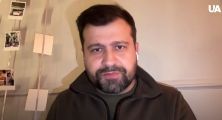Crimea is out of fresh water. Occupational authorities that illegally annexed peninsula are asking Russia to negotiate with Ukraine to supply water from the Dnipro river to Crimea. Before the occupation, 85% of Crimean drinking water was delivered by the Dnipro canal. Ukraine cut water supplies to Crimean peninsula along with the start of the Russian occupation back in 2014. To talk more about this, we are joined in our studio today by Julia Kozdobina, an adviser to the Ukrainian Minister Of Information Policy. Julia, thank you for joining us.
— Hello, thanks for having me.
— So, as I have already mentioned, by all the accounts, Crimea has enough water, enough drinking water for the population of the peninsula. Yet still, the occupational authorities are aking official Moscow to initiate negotiations with Ukraine for supplying the drinking water from Dnipro to Crimea. We all know that geographically Dnipro does not flow across Crimea. So what`s happening?
— Well, as you mentioned, almost 85% of Crimean water prior to the occupation came from Ukraine, from mainland Ukraine. The channel was built specifically for that, after Crimea’s transfer from Russia to Ukraine, in the Soviet Union times. And so according to the Ukrainian position, the peninsula has enough fresh water for supplies population with water that came from Dnipro river channel. It was used mostly for agricultural purposes. And now the Russian authorities are using a lot of water in the peninsula, for the purpose of supplying new population moving to Crimea, meaning mostly the military personnel, for the local industry, and so I think what they are trying to do is they want to play on this issue that there is not enough water in Crimea, and under international law Ukraine has the obligation not to violate the human rights of Crimea’s residents.
— First off. And also under international law, Crimea is Ukraine.
— And it’s true, but the thing is not violating the rights of the Crimean population, because there is enough drinking water. It’s Russia who decides to distribute it in such a way, it distributes away from the population into the military-industrial complex. And also it’s the obligation of the occupying power to provide all the necessary livelihood for the people, I mean they can initiate negotiations, but Ukraine`s position at this point is that: you guys are the occupying power, and it’s your job to supply water there.
— We do already have the response of Ukrainian president. To be specific, it’s Ukrainian permanent representative to the Autonomous Republic of Crimea, Anton Korinevich. He said that Ukraine is not going to negotiate, Crimea is the territory of Ukraine, Crimea is not the territory of the Russian Federation. Therefore the Russian Federation cannot raise issues relating to Crimea in interstate relations. Issues related to Crimea can be raised only by a certain state that is Ukraine. What would be the best effective way for the Ukrainian government to behave in such a situation — not to turn into a country that is violating the international law and the human rights of the people who are residing on the occupied peninsula?
— I think our current position is very clear. And that’s the only position that Ukraine can take in the situation — to provide the explanation that A) Crimea does have enough water to service population, and also explain how Russia is using the water, just the way the Ukrainian government is doing. And also emphasize that the Russian authorities from the very beginning wanted Ukraine to sign an agreement with the local authorities in Crimea. And we do not recognize them as the country, and we do not recognize the fact that Russia violated the international law, annexed Crimea, and considers Crimea a part of Russia, and calls it not Autonomous Republic of Crimea — which it is, but it’s a part of Ukraine. Russia calls it “Republic of Crimea” and tries to get Ukraine to sign an agreement, they want Ukraine to recognize the annexation, so to speak, by fiat. But that’s something that the Ukrainian government should not and cannot do, because the policy of non-recognition of annexation is firmly in place, and under this policy, we can’t do that.
— Touching upon the agricultural issue. The so-called “water shortage” in Crimea — has it harmed the agriculture?
— It has already harmed agriculture. What’s happening, is the Crimean agriculture had a lot of rice before the occupation, and rice production is very water-intensive, and it takes place mostly in Northern part of Crimea, and where most of the water supplies came to. And after the water supplies were cut, the rice production in Crimea shrunk. I don’t think they are producing more rice. But… it’s a structural change in the economy, I mean.
— A lot of experts offered an idea based on the fact that Ukraine cut off the channel that supplied Crimean peninsula water from the Dnieper, after the occupation in 2014. In exchange for de-occupation, de-annexation, Ukraine starts to fulfill its obligations, filling the channel with water. Your opinion – how will it stick with this? If suggested, will Russia go for it?
— Well, this is the position of Ukraine, but it’s not, so to speak, a bargaining position. When we say to Russia: well, you need water in Crimea, and we will supply it after you leave Crimea — it’s not a bargaining strategy, it’s not something that likely will interest them. Because why do they care if there is water in Crimea after they’re gone?
So from the point of view of bargaining or negotiation, this position doesn’t make sense, but at the point of view of… well, that’s your responsibility to supply water and if you are failing, so get out, and we’ll do it! It’s a kind of ultimatum, no so much about bargaining.
— Well, hope the situation will resolve the best for residents of Crimea and Ukraine. Thank you so much.
— Thank you.













